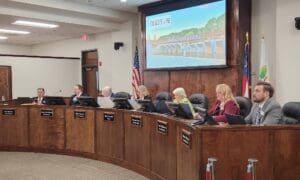Peachtree City Council members had nothing but good things to say about the staff-proposed $29.58 million budget at its first workshop on the document Monday night.
Staff was widely lauded by council members for the budget, which will not require a property tax increase and does fill a funding gap for cart and road paving projects for the upcoming fiscal year.
The budget from staff includes the use of $794,000 in unrestricted cash reserves though the city will still have more than 34 percent of its annual budget in that category. City policy dictates a minimum of only 20 percent.
City resident John Dufresne asked how much of those funds the city could spend down without risking a downgrade to the city’s AAA credit rating. Finance Director Paul Salvatore noted that some critical repairs are necessary in the coming year to several bridges in particular which may require the city to dip further into that reserve if the countywide sales tax is not approved.
The budget also includes a second proposed facilities bond to be used to upgrade deteriorating infrastructure in the city. That bond, which staff has suggested should be for $2.5 million, would not require a tax increase either because the city can use debt service capacity freed up by the recent paying off of the airport authority bonds, officials said.
The debt service on such a bond would be about $298,000 a year over 10 years, according to Salvatore, who projected it would go to market early next year presuming it is approved by council.
At the conclusion of staff’s presentation, Mayor Don Haddix said he had no criticism of staff’s work on the budget, which he sized up as “praiseworthy.”
Councilwoman Kim Learnard said she was “thrilled” with the results from four years of hard work to eliminate the $22 million shortfall from the city’s five-year budget plan.
“It’s hard to argue with a zero millage rate increase the next five years,” Learnard said. “… I am not only comfortable with this budget, I am ecstatic.”
Councilwoman Vanessa Fleisch said she was pleased that the budget focused on improving infrastructure that has long been without maintenance and needed to be caught up with.
Councilman George Dienhart thanked staff and said the budget was an example of staff continuing to exceed council’s expectations.
That harmony among council members was missing earlier in the meeting with a lengthy exchange between Haddix and Councilman Eric Imker. The exchange included a presentation by Imker showing that the average-priced city home would pay $668 a year in city taxes, just $2 higher than in 2010. By contrast, residents pay more for water and sewer bills for example, Imker said.
Haddix countered that Imker’s chart showing city property taxes did not include stormwater fees, which the city recently increased, and other fees citizens pay that are similar to taxes.
Citizens, Haddix argued, look at the whole cost they pay and not just the slice attributable to property taxes.
When the mini-debate ended, Imker seemed satisfied that he had met his goal.
“I wanted to prove the mayor has to have the last word, and the mayor is always right.”
In his presentation, Imker contended that going from a $22 million shortfall in the city’s five-year budget model that existed four years ago to the stable budget seen today and projected for the future was “a miracle.”
Staff warned that the city does face a potential future problem if county voters don’t approve a proposed one-cent sales tax proposed by the Fayette County Commission. That two-year tax would give the city $12-13 million to use on road and cart path repavings, but without the funds, the city will need another means to pay for the work.
Staff’s suggestion is if the sales tax vote fails this November for the city to pursue a referendum the following year for voter authorization on a general obligation bond to pay for the work, which would necessitate a property tax rate increase of about .6 mills. Alternatively, council could look at simply raising the property tax millage rate or making further cuts to the budget.
Imker contended that if the economy comes back and brings the property tax digest with it as suspected, the city might not need to do any of the above, as increasing property values would close the funding gap left by the exhaustion of funds from the 2004 countywide transportation sales tax.










Leave a Comment
You must be logged in to post a comment.